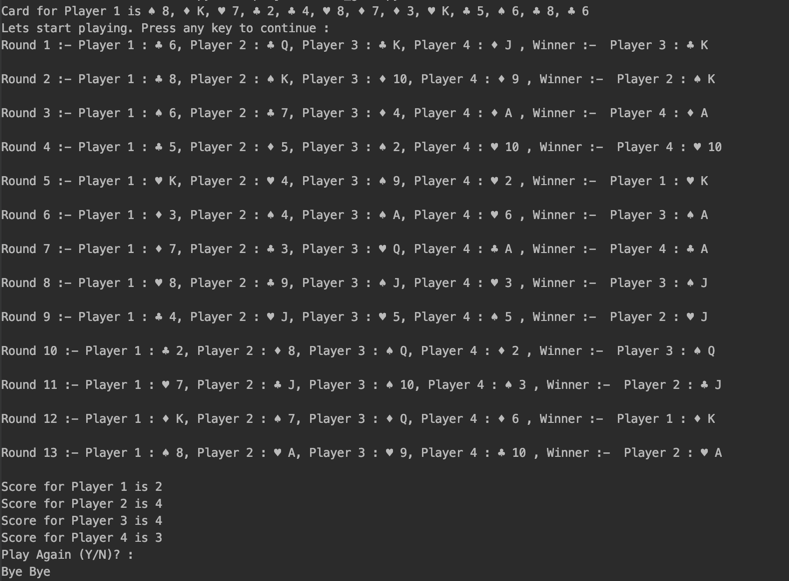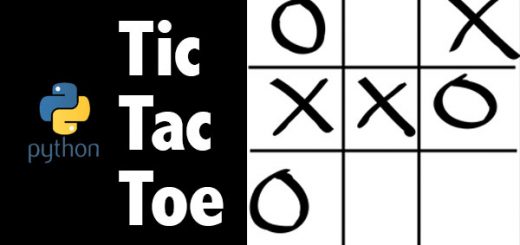Card Game Mini Project in Python
This is the second post in a series of mini-projects for Python where you can learn programming knowledge related to python and implement them as a project.
To begin the implementation in Python, make sure you have the following tutorials covered:-
Source code for the mini-project of card game using python
import random
import sys
class Card:
suits = ['\u2666', '\u2665', '\u2663', '\u2660'] # ["Clubs", "Diamonds", "Hearts", "Spades"]
ranks = ["2", "3", "4", "5", "6", "7", "8", "9", "10", "J", "Q", "K", "A"]
def __init__(self, suit=0, rank=0):
"""Default constructor """
self.suit = suit
self.rank = rank
def __str__(self):
"""Returns a human-readable string representation """
return '%s %s' % (Card.suits[self.suit], Card.ranks[self.rank])
# return '%s of %s' % (Card.rank_names[self.rank], Card.suit_names[self.suit])
def __lt__(self, other):
"""Overriding < operator """
t1 = self.rank, self.suit
t2 = other.rank, other.suit
return t1 < t2
class Deck:
def __init__(self):
"""Initializes the Deck with 52 cards."""
self.cards = []
for suit in range(4):
for rank in range(13):
card = Card(suit, rank)
self.cards.append(card)
self.shuffle()
def __str__(self):
"""Returns a string representation of the deck."""
res = []
for card in self.cards:
res.append(str(card))
return ', '.join(res)
def __len__(self):
"""Overriding len operator"""
return len(self.cards)
def add_card(self, card):
"""Adds a card to the deck."""
self.cards.append(card)
def pop_card(self, i=-1):
"""Removes and returns a card from the deck.
i: index of the card to pop; by default, pops the last card.
"""
return self.cards.pop(i)
def shuffle(self):
"""Shuffles the cards in this deck."""
random.shuffle(self.cards)
def sort(self):
"""Sorts the cards in ascending order."""
self.cards.sort()
def wincard(self, cards):
"""Get the highest winner card from list"""
winner = cards[0]
for card in cards:
if winner < card:
winner = card
return winner
class Hand(Deck):
"""Represents a hand of playing cards."""
def __init__(self, label=''):
self.cards = []
self.label = label
self.wincount = 0
def getlabel(self):
""" Store players name """
return self.label
def roundwinner(self):
""" increasing the win count for player """
self.wincount += 1
def getwincount(self):
""" get the winner count finally """
return self.wincount
def __str__(self):
return "Card for " + self.label + " is " + Deck.__str__(self)
def play(argv):
deck = Deck() # initialize deck
hands = []
for i in range(1, 5):
player = 'Player %d' % i # default player name
if len(argv) > i:
player = argv[i] # get player name from command line parameter
hands.append(Hand(player)) # add player
while len(deck) > 0:
for hand in hands:
hand.add_card(deck.pop_card()) # remove card from deck and add to hand
print(hands[0]) # print first player card
input("Lets start playing. Press any key to continue : ") # wait for keypress
for i in range(1, 14):
cards = [] # collect card in a round
floors = [] # get string representation for display in each round
for hand in hands:
card = hand.pop_card()
cards.append(card) # collect individual card
floors.append(hand.getlabel() + " : " + str(card)) # add string format for individual card
winner_card = deck.wincard(cards) # check for winner card
winner_hand = hands[cards.index(winner_card)] # find the winner hand from winner card
winner_hand.roundwinner() # add score for winner hand
print("Round", i, ":-", ", ".join(floors), ", Winner :- ", winner_hand.getlabel(), ":", winner_card)
input() # wait for keypress to go for next round
for hand in hands: # display the individual hand score after the 13 rounds of play
print("Score for", hand.getlabel(), "is", hand.getwincount())
def main(argv=[]):
answer = "Y"
while answer.upper() == "Y":
play(argv)
answer = input("Play Again (Y/N)? : ")
print("Bye Bye")
if __name__ == '__main__':
main(sys.argv)
The output of the above code is:-

You can find the complete code in Github link.



